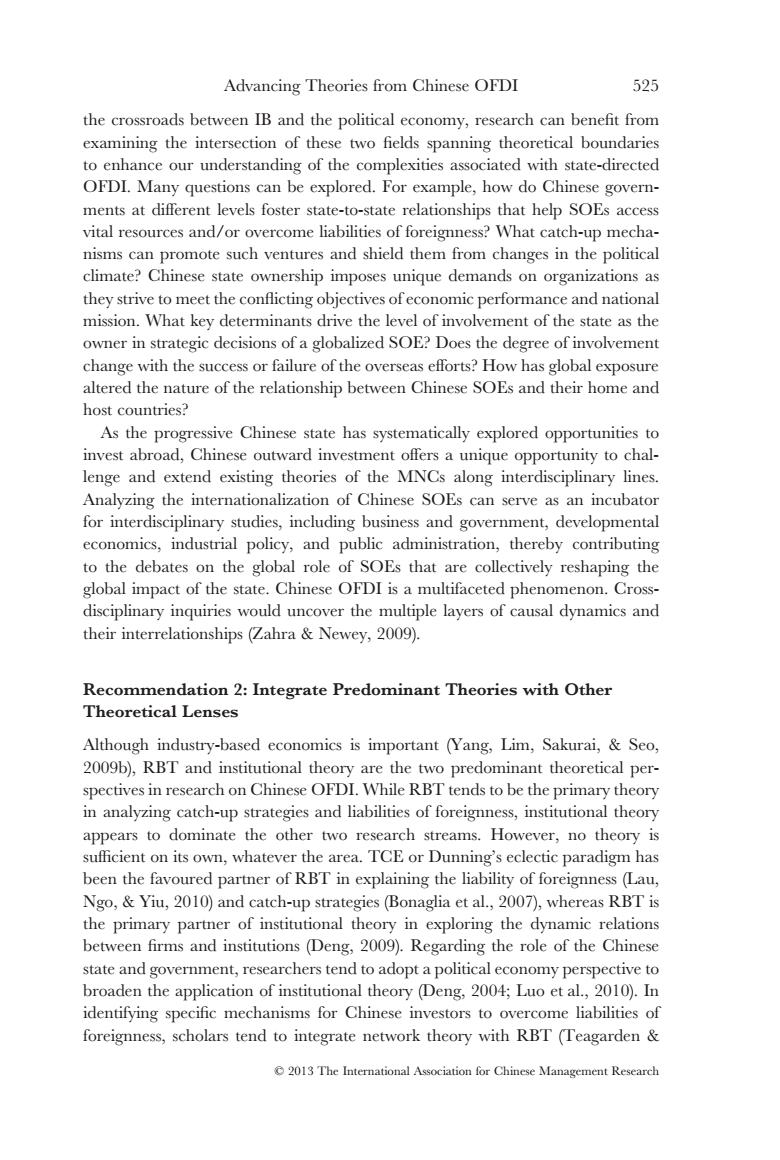正在加载图片...

Advancing Theories from Chinese OFDI 525 the crossroads between IB and the political economy,research can benefit from examining the intersection of these two fields spanning theoretical boundaries to enhance our understanding of the complexities associated wit state-directed OFDI.Many questions can be explored.For example,how do Chinese govern- ments at different levels foster state-to-state relationships that help SOEs access vital resources and/or overcome liabilities of foreignness?What catch-up mecha- nisms can promote such ventures and shield them from changes in the political climate?Chinese state ownership imposes unique demands on organizations as they strive to meet the conflicting obiectives ofeconomic performance and national mission.What key determinan s drive the level of involve nent of the state as the owner in strategic decisions of a globalized SOE?Does the degree of involvement change with the success or failure of the overseas efforts?How has global exposure altered the nature of the relationship between Chinese soEs and their home and hostcountries? As the progressive Chinese state has systematically explored opportunities to invest abroad,Chinese outward investment offers a unique opportunity to chal- lenge and extend existing theories of the MNCs along interdisciplinary lines. Analyzing the internationalization of Chinese SOEs can serve as an incubato for interdisciplinary studies,including business and government,developmental economics,industrial policy,and public administration,thereby contributing to the debates on the global role of SOEs that are collectively reshaping the global impact of the state.Chinese OFDI is a multifaceted phenomenon.Cross disciplinary inquiries would uncover the multiple layers of causal dynamics and their interrelationships (Zahra Newey,2009). Recommendation 2:Integrate Predominant Theories with Other Theoretical Lenses Although industry-based ecor nomics is important (Yang,Lim,Sakurai,&Seo 2009b),RBT and institutional theory are the two predominant theoretical per- spectives in research on Chinese OFDI.While RBT tends to be the primary theory in analyzing catch-up strategies and liabilities of foreignness,institutional theory appears to dominate the other two research streams.However,no theory is sufficient on its own,whatever the area.TCE or Dunning's eclectic paradigm has been the favoured partner of RBT in explaining the liability of foreignness (Lau, Ngo,Yiu,2010)and catch-up strategies(Bonaglia et al.,2007),whereas RBT is the primary partner of institutional theory in exploring the dynamic relation between firms and institutions(Deng,2009).Regarding the role of the Chinese state and government,researchers tend to adopt a political economy perspective to broaden the application of institutional theory Deng,Lo).In identifying specific mechanisms for Chinese investors to overcome liabilities of foreignness,scholars tend to integrate network theory with RBT (Teagarden 2013 The International Association for Chinese Management Research the crossroads between IB and the political economy, research can benefit from examining the intersection of these two fields spanning theoretical boundaries to enhance our understanding of the complexities associated with state-directed OFDI. Many questions can be explored. For example, how do Chinese governments at different levels foster state-to-state relationships that help SOEs access vital resources and/or overcome liabilities of foreignness? What catch-up mechanisms can promote such ventures and shield them from changes in the political climate? Chinese state ownership imposes unique demands on organizations as they strive to meet the conflicting objectives of economic performance and national mission. What key determinants drive the level of involvement of the state as the owner in strategic decisions of a globalized SOE? Does the degree of involvement change with the success or failure of the overseas efforts? How has global exposure altered the nature of the relationship between Chinese SOEs and their home and host countries? As the progressive Chinese state has systematically explored opportunities to invest abroad, Chinese outward investment offers a unique opportunity to challenge and extend existing theories of the MNCs along interdisciplinary lines. Analyzing the internationalization of Chinese SOEs can serve as an incubator for interdisciplinary studies, including business and government, developmental economics, industrial policy, and public administration, thereby contributing to the debates on the global role of SOEs that are collectively reshaping the global impact of the state. Chinese OFDI is a multifaceted phenomenon. Crossdisciplinary inquiries would uncover the multiple layers of causal dynamics and their interrelationships (Zahra & Newey, 2009). Recommendation 2: Integrate Predominant Theories with Other Theoretical Lenses Although industry-based economics is important (Yang, Lim, Sakurai, & Seo, 2009b), RBT and institutional theory are the two predominant theoretical perspectives in research on Chinese OFDI. While RBT tends to be the primary theory in analyzing catch-up strategies and liabilities of foreignness, institutional theory appears to dominate the other two research streams. However, no theory is sufficient on its own, whatever the area. TCE or Dunning’s eclectic paradigm has been the favoured partner of RBT in explaining the liability of foreignness (Lau, Ngo, & Yiu, 2010) and catch-up strategies (Bonaglia et al., 2007), whereas RBT is the primary partner of institutional theory in exploring the dynamic relations between firms and institutions (Deng, 2009). Regarding the role of the Chinese state and government, researchers tend to adopt a political economy perspective to broaden the application of institutional theory (Deng, 2004; Luo et al., 2010). In identifying specific mechanisms for Chinese investors to overcome liabilities of foreignness, scholars tend to integrate network theory with RBT (Teagarden & Advancing Theories from Chinese OFDI 525 © 2013 The International Association for Chinese Management Research